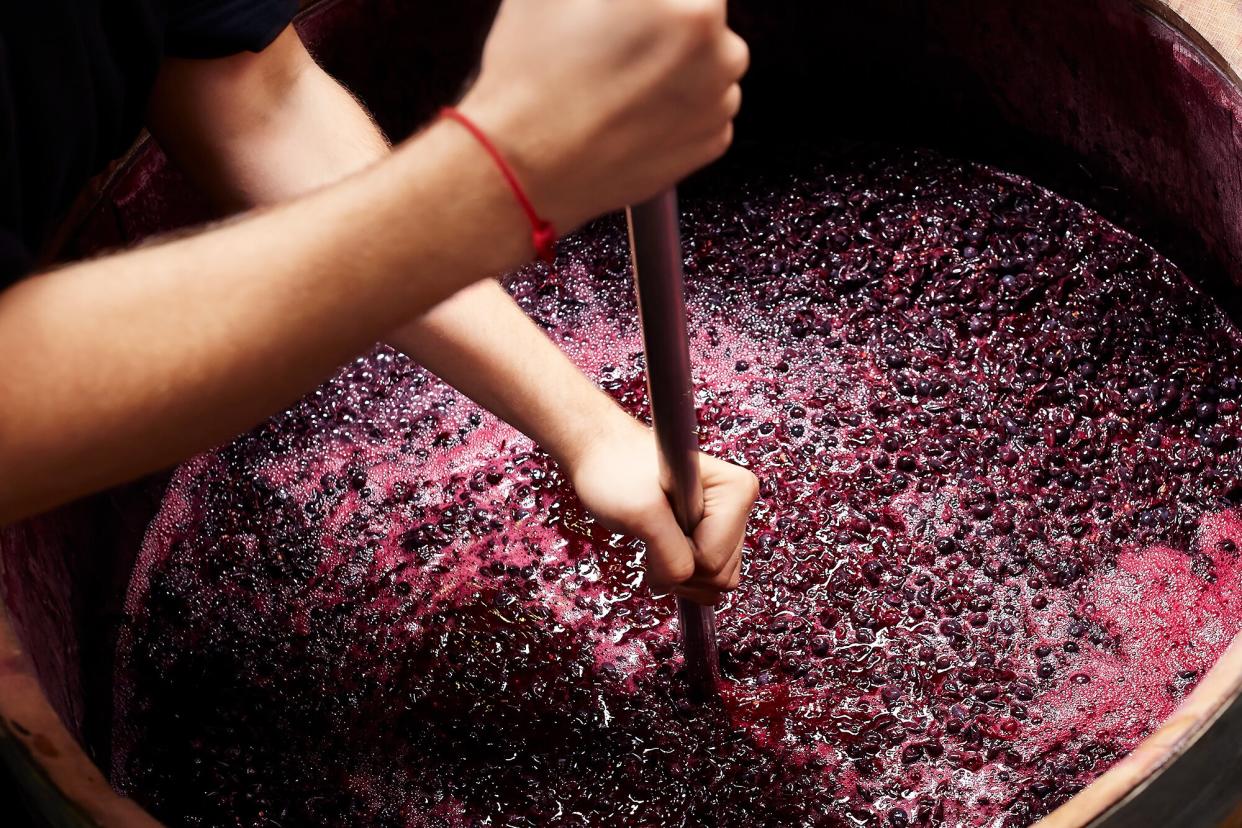Natural Wine 101: An Explainer on Low-Intervention Wine

Abel Mitja Varela / Getty Images
Dispelling the Natural Wine Resistance
The style seizing wine lists is more straightforward than smelly, gassy glasses once suggested.
Despite my own wine aversions, I have to resist interfering when a drinking companion vehemently refuses a single style or varietal. Experience uncovers the nuance in each glass of buttery or minerally Chardonnay, dry or divisively sweet Riesling, and yes, seemingly soapy or delightfully punchy orange wine. Styles have spectrums, and while natural wine may seem off the chart at first taste, it's all about resisting interference — however cloudy the outcome.
What Is Natural Wine?
As with any natural product, the term natural wine simply indicates that nothing artificial has been added to the grape growing or winemaking processes. Natural winemaking aims to express the essence of wine without interference, and it's up for interpretation.
Humans have intervened with wine to impact everything from flavor to appearance with conventional fining, filtering, degassing, and mass production. The elimination of manipulation is all about understanding and potentially appreciating what's not happening — viticulture free of herbicides and pesticides and winemaking free of the more than 50 additives, from synthetic yeast to liquid oak extract, approved for use in Europe and the U.S. Everything in natural wine occurs naturally, and the fermented grape juice is produced with traditional practices – the term may be trendy, but the methods are actually ancient.
Not all organic wine is necessarily natural, but all natural wines are made with organically or biodynamically grown grapes, typically hand harvested. Natural wine can contain no or low sulfites (10-100 parts per million versus the 350 ppm allowed) to preserve the product, preventing oxidation, as it's bottled.
Natural wine can be cloudy or retain sediment from forgoing filtration and clarification. It can also be earthy, effervescent, wild, enjoyably unpredictable, and endlessly interesting. Enthusiasts and experts use terms from true to raw to unadulterated to articulate the nature of the many wines in this broad category, which may manifest as hazy, funky, or sour — but each natural wine is as unique as its terroir and fermentation techniques.
What It Isn't
It isn't official outside of France. Wine has a world of designations for origin, quality, and aging classification. The U.S. has certifications for organic and biodynamic vineyards, but only France has made "vin methode nature" a governed designation with a three-year trial label.
Wine shops and wine lists often denote bottles that are biodynamic, natural, organic, or sustainable, much like kosher or vegan notation, sometimes using colors or symbols. I look for green tags at Urban Wines and Spirits in Manhattan's East Village and ladybugs at Liquor Up & Wine Down in Gramercy.
Natural wines aren't objectively better or healthier than conventional wine, and curious consumers can explore the style as with any other. Evaluate aroma, appearance, body, and flavor, and consider comparative or blind tastings. Science hasn't backed the notion that sulfites correlate with hangovers, so there's no proof that natural wine prevents that impending pain. But much like honey doesn't hit quite like packets of processed sugar, you may simply feel better after reasonable consumption.
No wine needs to be intimidating, and natural wine celebrates simplicity the way that chefs champion simple preparation to let seasonal produce shine. There's a reverence to restraint. A wine shop guru in New York's Grand Central Station recently described a natural winemaker as "so primitive they practically don't have electricity" to conjure the image of ancient methods.
Perhaps as obvious as it is necessary to note, natural wine is as subjective as pretension. The term living wine and notion of respecting nature are not exclusive to this abstract style (though fizzy natural wines can be distinctly lively), and with winemaking, intervention can have as much intentionality as the social change and sustainability we're seeing in the industry. Tasting is interpretation and all makers have a story to tell.
How It Started
Georgians buried grape juice to ferment the first wine around 6,000 BC, literally the beginning of natural winemaking. The modern move away from machinery and manipulation is credited to a variety of influencers because of the ambiguous nature of the style. Wine expert Randy Caparoso credits California wine merchant Kermit Lynch for terroir advocacy in the 1980s, but even in Berkeley the term "natural" surfaced far more recently to encompass the intentionality of small producers returning to their roots.
World-renowned wine educator Kevin Zraly doesn't even touch on the term natural wines in his famous "Complete Wine Course," and like many old-school experts, he uses quotation marks when finally mentioning "natural" wine in a 2021 Facebook post: "These wines remind me of that saying 'what's old is new again,' with small, artisanal producers shaking up the wine world with their 'old-style winemaking' of returning to the earth and not interfering with nature."
Our own expert Ray Isle trusts "Natural Wine for the People" author Alice Feiring, one of the pioneers in what's often considered a movement. Natural winemakers experiment with fermentation in much the same way chefs have been researching umami in labs. Time, temperature, and conditions can naturally affect the outcome of fermentation with anything from stinky cheese to homemade mead.
In Catalunya, Costador is fermenting an indigenous black grape called Sumoll in clay amphorae, or ancient jars. In Paso Robles, AmByth Estate still crushes grapes by foot and ages in clay or terra cotta vessels. France's Les Capriades disgorges pétillant naturel (natural sparkling) wine "à la volée" (by hand) to eliminate sediment, and biodynamic vineyards like South Africa's Reyneke Wines are guided by constellations and the moon.
Whether you order a pét-nat or a Pinot Noir, natural wine's for the consumer who cares how it was made.

